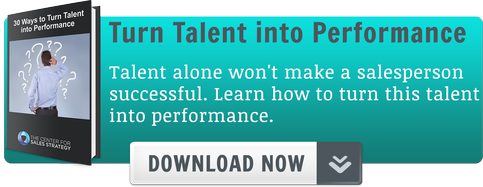
You might be surprised to learn that someone who lived in the early 300s BC had something to say about the role that talent plays in productivity, and that someone was none other than the Greek philosopher Plato.
Here is what he said:
“More will be accomplished, and better, and with more ease, if every man does what he is best fitted to do, and nothing else.”
So, is that a crazy notion? Think of your own experience…
What do you do best in your job? You can probably answer that easily, right?
Now, what do you do most in your job? You can probably respond to that one pretty well too.
Kudos to you and your employer if you gave the same answer to both questions. Most people can’t. What they do best and what they do most are misaligned.
Now, think about how much time you spend doing what you do best vs. how much time you spend doing what you do most. What if you could spend more time doing what you do best? Would your productivity go up? How about your company’s return on its investment in you? I think we know what the answer is.
How can managers and executives set others up to do what they do best most of the time?
Hire the right people. Cast them carefully (even tweaking the job description to increase the person’s productivity). When you align the right natural talents with the job requirements and expectations, the person’s instincts and habits prompt them to do what you want them to do—even when you’re not looking!
Every job has a set of behaviors that allow the right person to excel because that person is so ideally suited. It’s easy to think about sports talent or musical talent. But what makes a good nurse, or a good tax accountant, or a good salesperson? In each case, there are innate talents that distinguish the best from the rest.
Great nurses are not only trained in medicine, but they also care about people in such a way as to make them feel better. Great tax accountants don’t just know the tax code and recent IRS rulings, they love to solve problems. In fact you might see them building jigsaw puzzles or playing Sudoku for fun. (That would not be me, by the way.) Great salespeople are naturally curious, often competitive, and already have years of success convincing people do things well before they take their first sales job.
You cannot teach these things. You can only hire people who already have these innate abilities.
If you’re looking for an ideal fit, here’s what you can do:
- Get comfortable with the notion of innate talent. You can train for some things, but not the most important things. You can train a salesperson on which questions to ask, but they will learn a lot more about the customer’s needs if they are naturally curious.
- Think about and learn about the innate talents that pertain to the job(s) for which you typically hire. Don’t confuse skills and talents. Skills can be taught (to the talented). Talents can only be hired.
- Find a validated talent measurement instrument that can help you find someone who displays the innate behaviors you are looking for. You need the objectivity of a validated instrument.
- Speaking of innate behaviors, make a list of those behaviors for each job for which you hire. Focus on behaviors – things like organized, focused, full of ideas and alternatives, caring, sets goals and follows them, easily gains the commitment of others, etc. There are hundreds of talents out there, but only a handful are related to top performers in the specific job you need to fill.
- Hire for talent first, then skills, and lastly experience. You can teach somebody skills, and give them experience, but you can’t give them talent any more than you can give the Tin Man a heart.
Wouldn’t be great if everyone who reported to you did what you wanted him or her to do even when you’re not looking? If you hold out for talent, that can happen!



